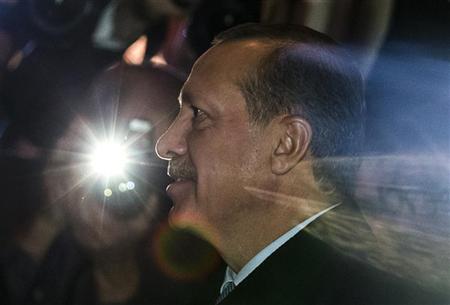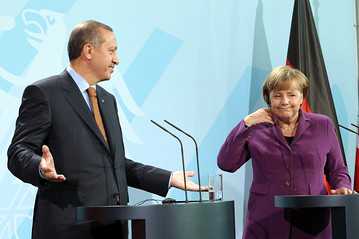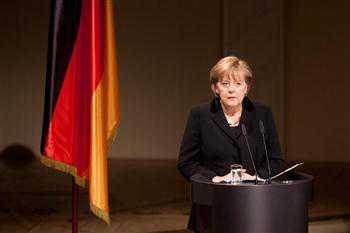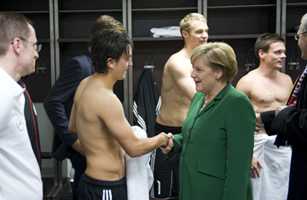Reuters
Feb 22, 2013 – 11:27
By Alexandra Hudson
BERLIN (Reuters) – Angela Merkel embarks on a tricky visit to Turkey on Sunday looking increasingly isolated in her personal opposition to its European Union entry bid and facing charges from Ankara that Germany is soft on Kurdish militants.
Her two-day visit occurs at a sensitive moment – a change of president in France is bringing new momentum to Turkey’s EU membership application, just as Ankara finds itself forced to re-engage more actively with the West as the conflict raging in Syria badly strains ties with its eastern neighbours.
Turkey has also launched fledgling peace talks with the jailed leader of the militant separatist Kurdistan Workers Party (PKK), aiming to end a 28-year-old conflict, and is incensed by continued fundraising and recruiting by PKK members abroad.
Merkel, chancellor since 2005, and Turkish Prime Minister Tayyip Erdogan, in power for a decade, have uneasy relations.
She finds his autocratic, macho style grating and provocative, while for Erdogan the German leader’s support for a “privileged partnership” falling far short of full EU membership typifies Europe’s “double standards” towards Turkey.
“Despite some undeniable differences of opinion on some issues, there has always been a foundation on which to base talks, a desire to understand each other and to show respect,” a German government official said when asked about relations.
Turkey’s EU accession negotiations, launched in 2005, are stalled due to an intractable dispute over the divided island of Cyprus, an EU member, and opposition from Paris and Berlin.
But last week Socialist French President Francois Hollande said he was ready to unblock talks with Turkey on the chapter dealing with help for EU regions. His conservative predecessor, Nicolas Sarkozy, strongly opposed Turkey’s EU aspirations.
Turkey has completed only one of 35 policy ‘chapters’ every accession candidate must conclude to join. All but 13 are blocked and the European Commission says Ankara does not yet meet EU standards on human rights and freedom of speech.
“France changed its attitude towards Turkey,” said Turkish Foreign Ministry spokesman Levent Gumrukcu. We expect Germany, an important EU member, to support Turkish accession talks.”
When Erdogan visited Berlin in October, Merkel told him the EU would be an “honest negotiating partner”.
Ruprecht Polenz, a member of her party and head of the parliamentary foreign affairs committee, suggested this week the chapter on human rights be opened.
“AFFECTION FOR TERRORISTS”
Far more pressing than EU accession is the PKK dossier. A government-approved trip by Kurdish delegates to see PKK leader Abdullah Ocalan in prison on Saturday may result in his calling for a ceasefire in the long-running insurgency.
Two weeks ago Erdogan blasted the EU and Germany for their “affection for terrorists” and said Turkey’s requests for the extradition of 408 individuals, more than half of them in Germany, had been rejected with “lame excuses”.
A German government official said: “Fighting terrorism is a joint effort and we are working closer together on this.”
Another German official said: “Erdogan sometimes oversteps the mark in his comments, but when you discuss certain themes it is possible to work together concretely.”
It is not only Kurdish militants Turkey says Germany allows to roam free. Embarrassingly for Berlin, a leftist suicide bomber who hit the U.S. embassy in Ankara at the beginning of February, just days before a visit by German Interior Minister Hans-Peter Friedrich, had spent years living in Germany.
Germany’s domestic intelligence service estimates there are 13,000 PKK members and active supporters in Germany, up from 11,500 in 2010. It also believes there are some 3,150 Turkish leftist militants from groups including the banned DHKP-C that was behind the U.S. embassy attack and 7,000 ultra-nationalists.
Around 3 million people in Germany, including 800,000 Kurds, have roots in Turkey. Some 1.7 million remain Turkish nationals.
The EU considers the PKK a terrorist group and Germany has prosecuted individuals for membership and financing.
“The roots of the Kurdish conflict or nationalism lie in Turkey. Turkey has to sort out these problems at home, before they start throwing accusations at us,” Friedrich told German newspaper Bild in a recent interview.
The PKK took up arms in 1984. The conflict has killed more than 40,000 people, destabilised Turkey and stunted development of the mainly Kurdish southeast.
Merkel’s trip begins with a visit to Germany’s Patriot missile batteries stationed with 320 troops in the eastern Turkish province of Kahramanmaras, 100 km (60 miles) from the Syrian border. Turkey asked its NATO partners for the missiles in order to deter any Syrian attack.
Erdogan and Merkel, accompanied by a large business contingent, will be on easier ground when they talk trade.
Turkey exported $13.9 billion (9.1 billion pounds) worth of goods to Germany in 2011, an increase of 21.6 percent, making it its largest export market. Imports of German goods stood at $23 billion.
Turkey exports mostly clothing and textiles to Germany, while it imports German cars, machinery and machine parts. Direct German investment in Turkey stands at $605 million.
(Additional reporting by Gulsen Solaker in Ankara, Andreas Rinke in Berlin, editing by Gareth Jones and Alistair Lyon)
Reuters
via EU doubts, Kurdish rebels cloud Merkel visit to Turkey – swissinfo.






